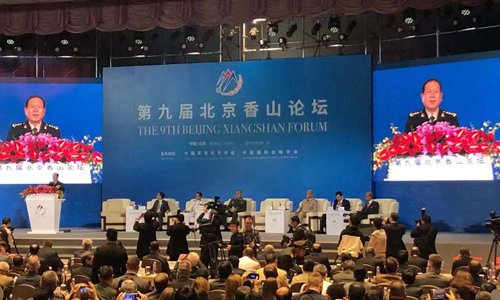HOME >> CHINA
US hostility causes peace talks’ deadlock: NK general
By Yang Sheng and Sun Haoran Source:Global Times Published: 2019/10/21 23:48:40

Defense Minister Wei Fenghe delivers a keynote speech at the opening ceremony of the 9th Beijing Xiangshan Forum on Monday. Photo: Sun Haoran/GT
A North Korean general criticized the US at the Ninth Beijing Xiangshan Forum in Beijing on Monday, saying that US hostility was the key reason peace talks have become deadlocked again, prompting Chinese and South Korean experts to note the process needed more international participation.
Colonel General Kim Hyong-ryong, vice minister of the Ministry of People's Armed Forces of North Korea, said at a forum plenary session on "Security Risk Management in the Asia-Pacific" on Monday that North Korea has made efforts to ensure peace on the peninsula and has fought against aggressive forces to guarantee its territorial integrity.
North Korea has a strong will and has constantly taken positive measures to make contributions to the world, such as its contributions to the inter-Korean summit, the Panmunjom Declaration and the military agreement between the two Koreas, Kim said.
Kim said that these efforts have eased the serious situation on the peninsula and made it move toward reconciliation, but due to the hostile policy of the US toward North Korea, the situation on the Korean Peninsula cannot be consolidated and instead has been trapped in a vicious cycle and standstill.
At the same time, the historical North-South joint declaration was not well implemented and fell into a stalemate because of South Korea's attack weapons and the joint military exercises of South Korea and the US, said Kim Hyong-ryong, adding that these ill military purposes run counter to the North Korea-US declaration and the Panmunjom Declaration.
Wang Junsheng, a research fellow of East Asian studies at the Chinese Academy of Social Sciences in Beijing, told the Global Times on Monday that "after North Korea stopped launching missiles and nuclear tests in 2018, the US actually has no reason to conduct further military drills with South Korea and deploy more attack weapons in the region, because this could only release a hostile signal to North Korea and even push it to step back from the way of denuclearization."
There were also no signs of optimism for negotiations between North Korea and the US since the handshake between Kim Jong-un and US President Donald Trump at Panmunjom in June.
The working-level nuclear talks in Stockholm, Sweden between officials from Pyongyang and Washington were broken off on October 5, dashing prospects for an end to months of stalemate, Reuters reported.
Breaking the deadlock cannot only rely on North Korea and the US since they have really low mutual trust, Wang noted.
Kim Heung-kyu, professor and director of the political science department at Ajou University in South Korea, who also attended the forum, told the Global Times that he hoped China would make much more detailed suggestions for the peninsula issue.
For the US part, Wang said, "The US should ask itself, to what extent it wants to realize peninsula denuclearization and peace process? We know that many US weapon deployments in the region since the Cold War are not just targeting North Korea but serving its strategic goal for great-power competition," by which he meant targeting China and Russia.
Posted in: MILITARY